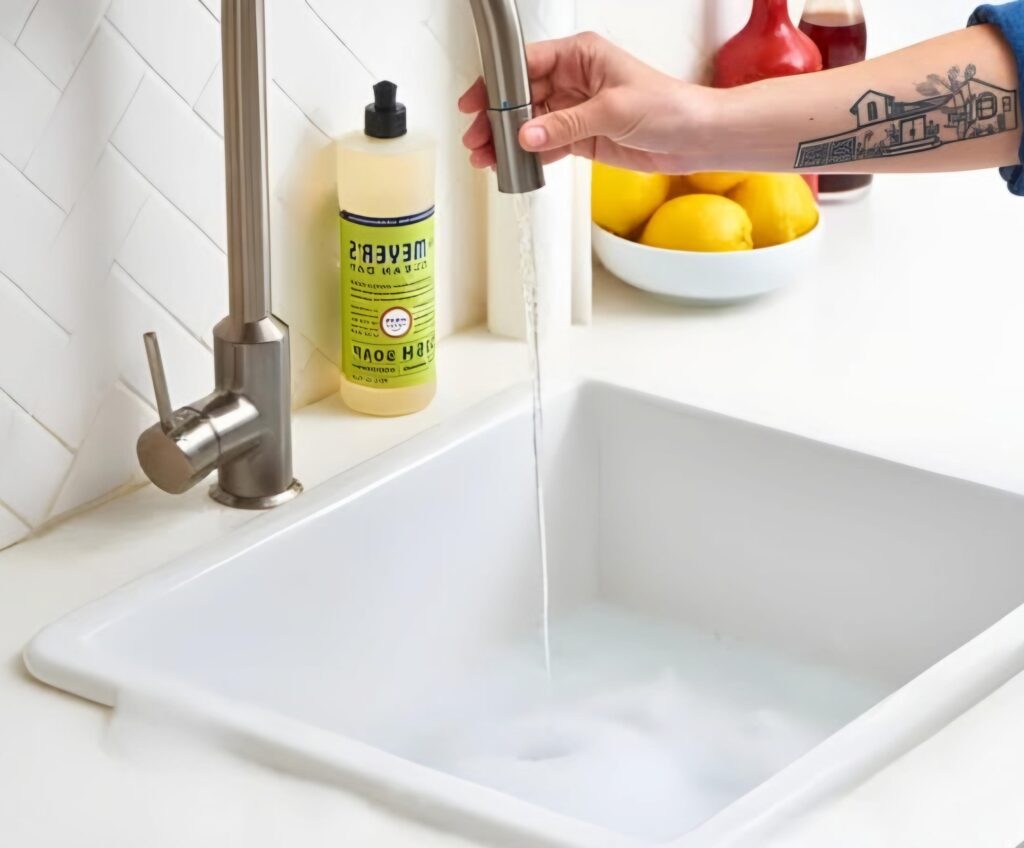Best tips for maintaining your kitchen sink in hard water areas. Discover methods to prevent limescale buildup and use natural cleaning solutions to maintain a gleaming sink. Follow these tips for effortless upkeep and a sparkling sink.
Image cradit: www.bhg.com
What is hard water, and what does it do?
Hard water has high levels of minerals, mainly calcium and magnesium. These minerals leave deposits and stains on any surface they touch, including your kitchen sink. Over time, these mineral deposits, known as limescale, can build up and cause clogging, dullness, and even damage to your sink. You need to look after your sink to keep it looking and working at its best.
Daily Routine
Rinse after every use.
Rinse your sink after every use. It’s a simple but effective way to stop mineral buildup. Use warm water to wash away food particles, soap residue, and minerals before they stick to the sink surface.
Dry
After rinsing, take a moment to wipe your sink dry with a soft cloth or paper towel. This is important to stop water spots and mineral deposits from forming. Pay extra attention to the corners and edges where water can sit.
Weekly Deep Clean
Vinegar Solution
Vinegar is a natural and effective way to remove hard water stains. Mix equal parts white vinegar and water in a spray bottle. Spray the solution over the sink and leave for about 15 minutes. The acid in the vinegar will dissolve the mineral deposits.
Baking Soda
After the vinegar has had time to work, sprinkle baking soda over the sink. Use a non-abrasive sponge or cloth to gently scrub the sink. The combination of vinegar and baking soda will create a fizzing reaction that will help lift away stubborn stains and deposits.
Rinse and dry.
After you’ve scrubbed the sink, rinse with warm water to remove any remaining vinegar and baking soda. Dry the sink thoroughly with a soft cloth to prevent water spots.
Monthly Maintenance
Check for clogs.
Hard water can cause clogs in your sink drain over time. Once a month, check for slow draining or blockages. Use a drain cleaner for hard water areas if needed. Regularly removing potential clogs will keep the water flowing and prevent buildup in the pipes.
Sink Shine
Shine your sink once a month to keep it looking its best and prevent mineral buildup. Use stainless steel or porcelain polish, depending on your sink material. Follow the manufacturer’s instructions and buff with a soft cloth to a high shine.
Products to use
Avoid scrubby cleaners.
Scrubby cleaners and scourers can scratch and damage the surface of your sink, making it more susceptible to stains and buildup. Use non-scrubbing products and tools to protect the finish.
Use hard water products.
There are many cleaning products on the market designed for hard-water areas. These products have ingredients that dissolve mineral deposits and prevent them from forming. Look for labels that say hard water friendly.
Prevention
Image cradit: apartmentchores.com
Get a water softener.
One of the best ways to combat hard water is to get a water softener. This device removes the calcium and magnesium ions from the water so they can’t cause buildup in your sink and other fixtures. This is a bigger investment, but it will save you time and effort in maintenance.
Sink Grid
A sink grid will protect the bottom of your sink from scratches and stains caused by heavy pots and pans. It also allows water to drain more efficiently, so there’s no standing water that can cause mineral deposits.
Natural Fixes for Tough Stains
Lemon Juice
Lemon juice is another natural fix for hard water stains. The citric acid in lemon juice works like vinegar in dissolving mineral deposits. Squeeze fresh lemon juice over the stains, let it sit for 10–15 minutes, then scrub gently with a sponge before rinsing and drying.
Cream of Tartar
Cream of tartar, used in baking, can also be a great cleaner for hard water stains. Make a paste with cream of tartar and a little water, apply it to the stains, and scrub with a non-abrasive cloth or sponge. Rinse thoroughly and dry the sink.
Severe limescale buildup
Commercial Descalers
For severe limescale buildup, you may need to use a commercial descaler. These products are designed to break down heavy mineral deposits. Follow the instructions carefully, and always wear gloves to protect your skin from harsh chemicals.
Professional Cleaners
If the buildup is too much for you to handle with home remedies and commercial products, consider hiring a professional cleaning service. Professionals have industrial-strength cleaners and tools to get your sink back to its original state.
Conclusion
Follow these tips for maintaining your kitchen sink in hard water areas, and your sink will stay looking and functioning great despite the hard water. Remember, consistency is key to preventing mineral buildup and keeping your sink the cleanest part of your kitchen.

